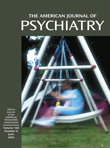Suicide and Major Depression
To the Editor: I wish to offer some comments on the article by Maria A. Oquendo, M.D., et al. (1). The topic of their study is important—how to reduce the occurrence of suicidal acts in people suffering from major depression. However, the present study contains some flaws in methods and logic that deserve comment.
In this naturalistic, prospective study, the authors wanted to demonstrate an association between antidepressant treatment and reduced acts of suicide. They did not find one and concluded that the reason was inadequate doses of antidepressant medication. However, their article did not support this conclusion. Their Discussion section stated, “We were unable to demonstrate that pharmacotherapy of major depression protected patients against suicide attempts,” and then went on to note that “nine (43%) of the 21 follow-up suicide attempts occurred while patients were receiving adequate treatment” (p. 1748). This is indeed the authors’ important finding. The problems with this article are in the first sentence of the discussion: “Relapse of recurrence of major depression increased the risk of suicide attempt during the 2 years after discharge from the hospital, underlining the importance of optimal maintenance antidepressant treatment as a suicide prevention strategy [italics added]” (p. 1748). But this association is precisely what their article does not show.
We know that the authors believe that there is a significant association here, as witnessed by their ample citations of European studies to support it. But their own study does not support it, and the authors think they know why—inadequate antidepressant dosing of the subjects during the study period. But even this case is not made convincingly. In their Method section, they asserted (without apparent reference) minimum adequate daily doses for 25 antidepressants. They did not state their basis for assigning these standards, by which they then measured adequacy of treatment. I do not disagree with the doses themselves (except for the authors’ recommendation of 400 mg/day of trazodone) but only with their treating these “guidelines” as if they were universally accepted and clinically meaningful. The act of using something as a premise that is in fact a conclusion to be proven is a form of begging the question, an error in the logic of question framing.
This problem is compounded in the Results section, where the authors attempted to show that over one-half of their study group was underdosed. They cited mean daily doses of fluoxetine (32.9 mg/day), paroxetine (42.5 mg/day), sertraline (120.7 mg/day), and citalopram (38.3 mg/day) as apparent evidence of underdosing. Yet these doses met the authors’ own standards! I work in a large group practice and know that these four antidepressants together constitute about 90% of all antidepressants in our setting. So were the patients in this study actually underdosed?
The authors can certainly be excused for following the common belief that antidepressants treat both depression and suicidality. But the inability of their study to support this belief should serve to make us cautious about our assumptions and careful about our questions. If the 43% of the authors’ study group receiving adequate antidepressant medication showed significant suicidal behavior after treatment, then something else must be at work. One cannot ascribe this to treatment resistance, as some authors do. Suicidality is not synonymous with depression, and treatment does not equal medication. An article such as this does not suffer so much from poor science as from a (common) failure in psychopharmacology research to “think outside the bottle.” At this time in our field, we still have not proven that selective serotonin reuptake inhibitors are clinically better than placebo (2). We all know that depression and acts of suicide are mentally complex phenomena. Until we begin studying them in sufficient depth, we will only get articles that raise more questions than they answer.
1. Oquendo MA, Kamali M, Ellis SP, Grunebaum MF, Malone KM, Brodsky BS, Sackeim HA, Mann JJ: Adequacy of antidepressant treatment after discharge and the occurrence of suicidal acts in major depression: a prospective study. Am J Psychiatry 2002; 159:1746-1751Link, Google Scholar
2. Kirsch I, Antonuccio D: Antidepressants versus placebo: meaningful advantages are lacking. Psychiatr Times 2002; 19:6-7Google Scholar



